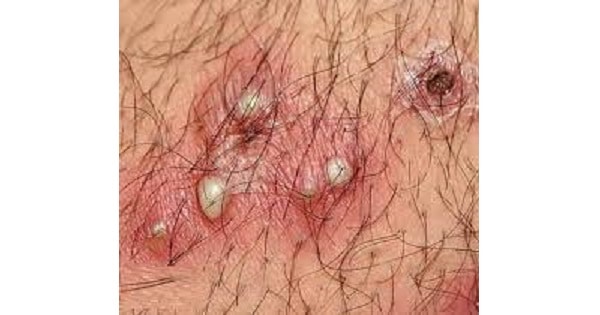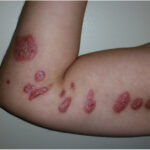Lymphogranuloma venereum (LGV) is a sexually transmitted infection (STI) caused by specific serovars (L1, L2, L3) of Chlamydia trachomatis. It primarily affects the lymphatic system and is more prevalent among men who have sex with men (MSM). Early detection and treatment are crucial to preventing severe complications.

Causes and Transmission
LGV is caused by Chlamydia trachomatis serovars L1, L2, and L3. The infection spreads through:
- Unprotected sexual contact (oral, anal, vaginal intercourse)
- Direct contact with infected mucosal surfaces
- Rare cases of perinatal transmission
Risk factors include multiple sexual partners, HIV co-infection, and unprotected anal intercourse.
Symptoms of Lymphogranuloma Venereum
LGV progresses through three distinct stages:
Primary Stage
- Small painless ulcer at the site of infection (penis, vagina, rectum, or mouth)
- Self-healing within days, often unnoticed
Secondary Stage
- Painful inguinal or femoral lymphadenopathy (buboes)
- Proctitis symptoms in receptive anal intercourse (rectal pain, bleeding, discharge, tenesmus)
- Systemic symptoms (fever, malaise, joint pain)
Tertiary Stage (Chronic LGV)
- Genital elephantiasis due to lymphatic obstruction
- Rectal strictures and fistulas
- Permanent tissue damage
Diagnosis
Diagnosing LGV involves:
- Nucleic Acid Amplification Test (NAAT) – Detects Chlamydia trachomatis DNA
- Serological Testing – Identifies antibodies (not highly specific)
- Culture & PCR Testing – Confirms serovars L1, L2, L3
- Clinical Examination – Based on symptoms and risk factors
Treatment Options
Antibiotic Therapy
- First-line treatment: Doxycycline (100 mg twice daily for 21 days)
- Alternative: Erythromycin (500 mg four times daily for 21 days)
- Azithromycin (1g weekly for 3 weeks) as an alternative regimen
Supportive Care
- Pain management with NSAIDs
- Drainage of buboes if necessary
- Counseling and partner notification to prevent reinfection
Prevention Strategies
- Consistent condom use during sexual activity
- Regular STI screening for high-risk groups
- Prompt treatment of partners to break the transmission cycle
- Public health education about symptoms and risks
Lymphogranuloma venereum is a serious STI with significant complications if untreated. Early diagnosis and prolonged antibiotic therapy are key to preventing long-term damage. Awareness, screening, and prevention strategies play a crucial role in reducing its spread.

